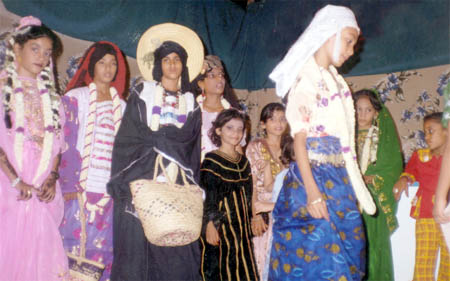
Arranged marriages and other old traditions [Archives:2002/16/Culture]
April 15 2002

MOHD AL-FAQEEH
FOR THE YEMEN TIMES
Cultural traditions in Yemen continue to play an important role in daily life, just as they did hundreds of years ago.
Some traditions have been rejected. For example, before, baby girls were not as valued as baby boys years ago, but that has changed in time.
Other traditions have been kept. For example in marriage, a young man has to look for the girl he loves and holds counsel with his family to engage her. Then the marriage agreement should be ratified and finally the wedding festival is held.
In some areas such as Hadhramout, when the girl becomes 12 year-old, her parents forbid her from going outside home, seeing any man, or being seen by a man until she gets married. This tradition is called al-Athrawa or singleness. Sometimes the girl is to have some of her hair cut in order to keep on being veiled, or have some of her hair combed in the form of rounded circles in order to be distinguished from the married women.
In other traditions, the parents choose the bride for their son, and he has no right to reject their choice. The parents expect that the love between the couple comes after getting married.
In some traditions, the parents give their son the right to choose the girl he loves but they do not give the girl. Such traditions have often gradually changed, however, due to education, co-ed education in particular.
In addition, there are some folk conventions and traditions which were strongly connected to the beliefs of the ancient Yemenis. For instance, some plants are still used in marriages such as Al-Hinnaa, on the hands of both the bride and bridegroom. The hands are washed on the first day of the wedding festivity called al-Hinnaa Night.
People believe that since Al-Hinnaa smoothes the skin and body, it can smooth the life of the couple. Other people think that Al-Hinnaa is a sign of the happy love and it protects the bride and bridegroom from devils and their evils.
Yemen has also many old traditions such as those of greeting and traveling. In Al-Mahrah, people greet each other with their noses.
The traditions that concern travel are followed according to the folk beliefs. If the person is traveling, he has to turn around and have a final look at his house and family as soon as the car starts moving. It is believed that when the person does so, he will come back to his family in good condition.
Also in the past, Yemenis used to slaughter a goat before entering a house for the first time. This tradition is still followed in several villages. The owner of the house should also invite the people of his village to lunch and chew qat all the afternoon long inside the new house. While chewing qat, people should sing some religious anthems together. It is believed that this protects the house from devils and their evils.
——
[archive-e:16-v:2002-y:2002-d:2002-04-15-p:./2002/iss16/culture.htm]


